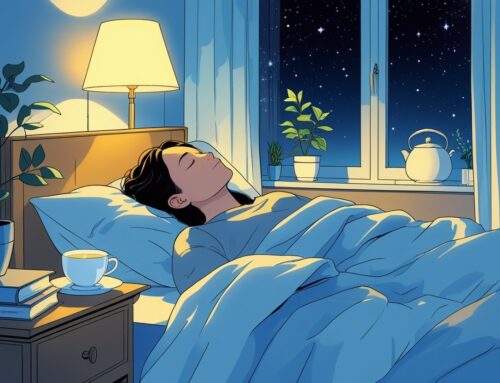Many people with dementia experience sleep problems that disrupt both their rest and overall health. Dementia causes changes in sleep patterns, which result in more daytime sleep and trouble staying asleep at night. These issues make daily life more difficult for both the person and those taking care of them.
Sleep disturbances often worsen as dementia advances. Common issues include difficulty falling asleep, frequent awakenings, or excessive daytime sleep. A clear understanding of these changes allows for better sleep management and helps improve overall quality of life.
Disrupted sleep also affects caregivers, yet identifying the causes and exploring practical solutions can provide much-needed relief. Exploring simple strategies and promising research offers hope for better sleep in dementia.
Key Takeaways
- Sleep patterns typically change as dementia advances.
- Addressing sleep issues improves daily life for both patients and caregivers.
- Practical strategies and emerging research offer effective ways to manage sleep disruptions.
- The right mattress supports better sleep in people with dementia by reducing agitation, improving stability, and helping regulate body temperature.


Sleep affects brain health, and changes in sleep patterns can influence dementia. At the same time, dementia disrupts how a person sleeps. These two factors affect each other and may worsen symptoms over time.
How Sleep Affects Dementia Progression
Poor or insufficient sleep raises the risk of developing dementia. People who sleep fewer than six hours per night in middle age face a higher likelihood of developing dementia later in life. Research shows that getting less than five hours of sleep doubles the risk of both dementia and death.
Sleep clears waste from the brain, including proteins associated with dementia. When sleep becomes disrupted, these proteins may accumulate more quickly. Adults aged 50 and older who sleep only five hours a night face a 30% greater risk of dementia.
Consistent and quality sleep supports memory and cognitive function. In contrast, poor sleep habits accelerate mental decline and worsen dementia symptoms over time.
Dementia’s Impact on Sleep Patterns
Dementia alters typical sleep cycles. People with dementia often experience reduced deep sleep and increased light sleep. This shift leads to more fragmented sleep and frequent nighttime awakenings. It also disrupts the body’s internal clock, or circadian rhythm, which makes it harder to fall asleep or stay asleep at consistent times. As dementia advances, sleep issues often become more severe, which can lead to increasingly restless nights.
Common problems include waking up too early, feeling excessively tired during the day, and wandering at night. These disruptions can make caregiving more challenging and reduce a person’s overall quality of life.

People with dementia often show clear changes in their sleep patterns. These may include feeling extremely tired during the day, sleeping less at night, and following irregular sleep schedules that can be difficult to manage.
Excessive Sleepiness and Fatigue
Many individuals with dementia feel more tired than usual. They tend to sleep for long periods during the day yet still appear exhausted. This heightened sleepiness occurs because dementia affects parts of the brain responsible for energy and alertness.
Caregivers often notice that those with dementia nap often and look drowsy, even after resting. This fatigue affects both the body and the mind, since changes in brain function reduce mental stamina. This creates a cycle where daytime tiredness disrupts nighttime rest.
Reduced Nighttime Sleep
Sleeping through the night often becomes a challenge. Those with dementia may need more time to fall asleep and often wake up several times before morning. These interruptions leave them feeling unrested by the start of the day.
Disruptions in the body’s internal clock also contribute to poor sleep. Dementia interferes with the brain’s natural timing, making it difficult to maintain steady sleep routines. As a result, nighttime sleep becomes shorter and more broken.
Irregular Sleep-Wake Cycles
Dementia can throw off the body’s typical sleep schedule. This confusion may lead to reversed sleep-wake cycles, where someone stays awake during the night and feels sleepy throughout the day. These shifts lower overall sleep quality and impact daily activities.
Since the brain struggles to distinguish between day and night, people with dementia may remain awake for long stretches overnight and nap too much during the day. The lack of a stable routine adds to confusion and deepens fatigue.

People with dementia often experience challenging behaviors at night that interfere with sleep. These may include agitation, yelling, or talking aloud, which can create stress for both the individual and their caregivers.
Nocturnal Agitation
Nocturnal agitation occurs frequently in dementia and may appear as restlessness, pacing, or repeated attempts to get out of bed. These behaviors often arise due to confusion, fear, or physical discomfort during the night. In cases of vascular dementia, disruptions such as fragmented sleep or excessive daytime drowsiness can contribute to nighttime agitation. Caregivers should remain attentive to potential triggers, including pain, hunger, or an uncomfortable room temperature.
Establishing a calm, familiar bedtime routine and maintaining a quiet, comfortable bedroom can help ease agitation. Turning off bright screens and reducing loud noise also promotes better sleep.
Yelling and Screaming at Night
Yelling or screaming during the night is a particularly distressing symptom of dementia. It may occur when the person feels confused, threatened, or unable to communicate an unmet need. Some individuals may begin by talking to themselves, which can escalate into loud shouting or screaming. This behavior often connects to sundowning, a phenomenon where confusion intensifies in the evening and throughout the night.
Caregivers can respond by speaking calmly, offering reassurance, or gently guiding the person back to bed. It also helps to keep the bedroom safe and clutter-free, especially if the person becomes disoriented or tries to leave the room.

Dementia causes various sleep problems depending on the stage of the illness. Sleep patterns shift as the condition worsens, disrupting both nighttime rest and daytime alertness. These disruptions range from difficulty falling asleep to more serious alterations in sleep structure.
Sleep Issues in Early Stage Dementia
In the early stage, people with dementia often struggle to fall asleep or remain asleep through the night. Insomnia and frequent nighttime awakenings are common. Daytime sleepiness may appear, though it typically remains mild.
REM sleep, the stage crucial for memory and brain function, often decreases. Sleep becomes fragmented, marked by frequent transitions between deep and light sleep. These interruptions can impair memory and increase daytime confusion.
Common signs include:
- Difficulty falling asleep
- Frequent nighttime waking
- Mild daytime fatigue
Sleep disturbances may not appear significant at first but can still influence daily functioning and mood.
Advanced Dementia and Profound Sleep Changes
In moderate to severe dementia, sleep problems intensify and grow more complex. Up to 50% of individuals in these stages face significant disturbances, such as prolonged wakefulness during the night and excessive sleep during the day. The circadian rhythm, the body’s internal clock, often becomes disrupted. Sleep may occur at irregular hours, leading to heightened confusion or agitation during the evening, a phenomenon called sundowning.
Sleep-disordered breathing and reduced REM sleep are frequent, contributing to declines in both cognitive and physical health. Excessive daytime sleepiness (EDS) further limits activity and engagement.
Key features in advanced stages:
- Severe nighttime insomnia
- Excessive daytime sleep
- Fragmented, irregular sleep cycles
- Altered circadian rhythm
These sleep changes impact both the quality of rest and overall well-being, emphasizing the importance of careful management.

Sleep problems in dementia result from changes within the brain as well as influences from the person’s surroundings and daily routine. These factors often combine to disrupt normal sleep patterns.
Neurological Mechanisms
Dementia alters how the brain manages sleep. A primary reason involves the reduced production of melatonin, the hormone that signals the body to sleep when it becomes dark. As dementia advances, the brain produces less melatonin, which makes falling asleep at night more difficult. Damage to the brain areas that regulate the sleep-wake cycle may cause individuals with dementia to feel sleepy during the day but alert at night. This shift in rhythm is common and interferes with maintaining a consistent schedule.
Additional neurological issues, including changes in REM sleep, play a role. For instance, some individuals with dementia experience REM behavior disorder, where they physically act out their dreams. This disrupts deep sleep and leads to increased confusion during the night.
Environmental and Lifestyle Factors
The environment significantly influences how well someone with dementia sleeps. Loud noises or insufficient natural light can worsen sleep disturbances. A lack of exposure to sunlight during the day may confuse the body’s internal clock.
Physical and mental fatigue also impact sleep quality. When a person becomes overly tired or overstimulated by the end of the day, they may become restless or struggle to fall asleep. Maintaining simple routines and increasing exposure to bright light during the day can improve sleep patterns.
Additional contributors include discomfort from conditions such as restless legs syndrome or breathing disorders during sleep. These issues often go undetected, yet they cause frequent awakenings throughout the night.

Managing sleep issues in people with dementia involves adjustments to daily routines and the environment, along with potential medical treatment. These methods aim to improve sleep quality, reduce nighttime awakenings, and enhance daytime alertness.
Behavioral and Environmental Strategies
Establishing a calm and predictable environment helps reduce sleep disturbances in individuals with dementia. Dimming lights in the evening and following a consistent sleep schedule support the body’s natural rhythm. Avoid screens and loud noises near bedtime.
Engaging in physical activity during the day improves nighttime rest. Caregivers can set a bedtime routine that includes quiet music or relaxation cues to indicate it is time for sleep. A cool and comfortable bedroom also encourages better rest.
Night lights help lessen confusion during nighttime wakefulness. Limit caffeine and avoid heavy meals close to bedtime to prevent disruptions. These non-medical strategies aim to make sleep safer and more manageable for people with dementia. For more tips, see managing sleep problems in Alzheimer’s disease.
Medical and Pharmacological Interventions
If behavioral approaches prove insufficient, medical intervention may be necessary. Doctors may prescribe medications to treat underlying issues such as anxiety or depression that interfere with sleep. Although some drugs may improve sleep, they require cautious use due to potential side effects and risks in dementia patients. Alternatives like light therapy can help regulate sleep cycles without medication.
Routine health evaluations help address pain or other medical problems that might disrupt sleep. Treatment plans often combine medication with environmental changes to support overall wellbeing.
Caregivers of people with dementia often face their own sleep challenges. Stress and worry can make it difficult to get proper rest. Supporting caregivers in maintaining their sleep health remains essential.
Behavioral changes may improve sleep patterns. Sleep hygiene, such as setting a consistent bedtime, limiting caffeine intake, and creating a calm sleep environment—offer helpful strategies. Practicing relaxation exercises before bed also helps ease anxiety.
Psychological support makes a meaningful difference. Cognitive behavioral therapy for insomnia (CBTI) teaches caregivers to reshape thoughts and habits that disrupt sleep. This approach involves methods like stimulus control and sleep consolidation.
Establishing consistent routines with the person living with dementia benefits both individuals. Keeping regular meal times and engaging in calming bedtime activities, like reading or listening to soft music, can promote better sleep for everyone involved.
Here is a simple list caregivers can follow to support better sleep:
- Keep a regular sleep schedule
- Create a quiet and comfortable bedroom
- Avoid electronic screens before bed
- Practice relaxation exercises or deep breathing
- Seek counseling or therapy if stress becomes overwhelming
Managing sleep requires effort but can reduce fatigue and improve overall well-being for caregivers and those they care for.
Research shows a strong link between sleep problems and dementia risk. Scientists are studying how poor sleep may predict cognitive decline, such as mild cognitive impairment (MCI). This research offers an opportunity to identify dementia early through sleep patterns. Current studies focus on sleep issues like insomnia and the use of sleep medications, which might increase the likelihood of developing dementia. Gaining insight into these factors helps guide better care and prevention strategies.
Future research aims to determine whether improving sleep can slow or prevent dementia. While evidence is insufficient to confirm this, sleep could serve as a key target for reducing dementia risk.
Important areas for study include:
- Effects of sleep interventions on brain health
- Relationship between different sleep disorders and dementia types
- Interaction between depression and sleep in dementia patients
Studies are also exploring the role of sleep quality in mental health and overall well-being for older adults. Better sleep research could enhance both cognitive function and mood. Understanding sleep’s role could help tailor interventions for those at risk, which makes it a promising area for future studies in dementia care and prevention.
A mattress designed for people with dementia can improve sleep quality by providing the proper support and comfort. Firm density foam mattresses provide a secure feeling, which may reduce restlessness during the night.
Key benefits of the right mattress include:
- Improved safety and stability
- Better body alignment
- Reduced nighttime agitation
Some mattresses feature non-slip surfaces or breathable materials, which help control temperature and minimize skin irritation.
Using the appropriate mattress can also support a healthy sleep routine. A good night’s rest can reduce confusion and boost daytime energy for people with dementia.
The Brooklyn Bedding Signature Hybrid mattress provides key benefits for individuals with dementia, as this mattress helps in improving comfort and sleep quality. Its firm support maintains stability and proper alignment to reduce restlessness and nighttime agitation. The hybrid design, with foam layers and encased coils, also provides pressure relief, which helps prevent sores from prolonged bed rest.
Brooklyn Bedding Signature Hybrid mattress breathable materials and cooling GlacioTex Cooling Cover regulate temperature to prevent overheating and enhance sleep quality. Its strong edge support adds stability, so it is easier to get in and out of bed.
Finally, this mattress motion isolation minimizes disturbances to ensure uninterrupted sleep. Overall, the Brooklyn Bedding Signature Hybrid combines support, comfort, and stability, which is why it’s an excellent choice for individuals with dementia.
For more information on mattress options to support sleep for people with dementia, check out their guide.

Frequently Asked Questions
Sleep patterns in dementia change as the disease progresses. Disturbances vary depending on the type and stage of dementia. Issues like daytime sleepiness, nighttime waking, and changes in behavior may arise.







